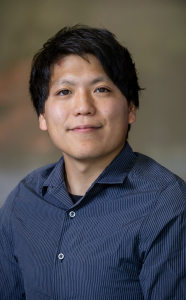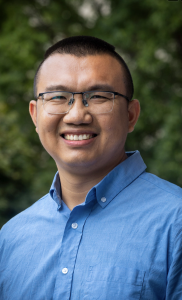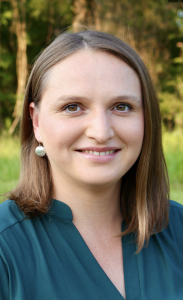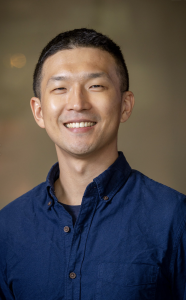Each year, the Postdoctoral Awards for Research Excellence (PARE) are given in recognition of the research promise demonstrated by individual postdoctoral scholars. Meet this year’s recipients and learn about their areas of interest.
The PARE awards are open to postdoctoral scholars in all disciplines. Each recipient receives a monetary award of $1,200 along with a plaque.
Each of these winners will be presenting their research activity at the PARE Talks during this year’s University Research Week. The PARE Talks will be held on Friday, October 27 at 3 p.m. in Koury Oral Health Science Building, Room G411.
This year’s PARE recipients are:
 Joji Tanaka, College of Arts and Sciences, Department of Chemistry
Joji Tanaka, College of Arts and Sciences, Department of Chemistry
Joji Tanaka is a postdoctoral researcher studying polymer chemistry and materials in the lab of Wei You. He led the creation of a new research field called Reversible-Addition Fragmentation Chain Transfer (RAFT) step-growth polymerization that will help scientists achieve previously unattainable polymeric materials with unique chemical composition and architectures.
Tanaka has helped You’s lab make unique discoveries in other novel polymerization methodologies, such as orthogonal polymerization platforms. His collective works have clear implications for technological development and impact on industry and biotechnology.
Ying Zhou, College of Arts and Sciences, Department of Applied Physical Sciences
Physical Sciences
Ying Zhou is a postdoctoral research associate in the lab of Jinsong Huang. He conducts research with the goal of developing perovskite photodetectors to replace commercial silicon photomultipliers (SiPMs) for photon counting . This promising research area can bring a revolutionary cost-effective approach to count photons and the success of this approach will benefit science and everyday applications including medical imaging, unmanned automatic driving, cameras, and more.
Zhou is the first author on more than 10 publications in prestigious journals like Nature, Nature Photonics, and Science Advances. In addition to his research, Zhou participates in interdisciplinary activities like seminars and recruiting events and actively works with graduate students to develop their skills and knowledge.
 Jessica Hoffman, School of Medicine, Bowles Center for Alcohol Studies
Jessica Hoffman, School of Medicine, Bowles Center for Alcohol Studies
Jessica Hoffman is a postdoctoral trainee in the behavior and molecular pharmacology lab of Clyde Hodge. Her work is based on the scientific premise that addiction to alcohol and other drugs is a form of maladaptive neuroplasticity. She is evaluating a novel protein as a fundamental mechanism that drives the rewarding effects of alcohol and is using molecular genetics and pharmacological strategies to evaluate therapeutic strategies that may help alleviate behavioral problems associated with addiction.
Hoffman’s publications have major significance for understanding how alcohol and drugs alter the brain to produce behavioral pathologies across the lifespan and may lead to new therapeutic approaches for treating alcohol use disorder.
Aleksandra Skrajna, Eshelman School of Pharmacy, Center for Integrative Chemical Biology and Drug Discovery
Integrative Chemical Biology and Drug Discovery
Aleksandra Skrajna is an American Cancer Society Postdoctoral Fellow in Robert McGinty’s lab. Her research focuses on understanding universal principles that govern interactions with the nucleosome, the repeating unit of chromatin, which stores the genetic information of cells. She identified nucleosome binding hot-spots and described amino acid resolution nucleosome footprints for hundreds of proteins representing diverse nuclear functions. Her work has settled long-standing debates in her field and opened new avenues of epigenetic research.
In addition to conducting research, Skrajna has been active in the postdoc community at Carolina, leading a series of monthly meetings and serving on the first postdoc advisory Committee at Eshelman. She will transition to an assistant professor position in the Department of Chemistry and Biochemistry at the University of California Santa Cruz in January 2024.
 Woosuk Steve Hur, School of Medicine, Department of Pathology and Lab Medicine
Woosuk Steve Hur, School of Medicine, Department of Pathology and Lab Medicine
Woosuk Steve Hur is a postdoctoral fellow in the lab of Matthew Flick in the UNC Blood Research Center. He focuses on uncovering the molecular and cellular mechanisms that link the development of thrombosis, obesity, and associated metabolic pathologies. Hur co-led research that demonstrated how selectively reducing circulating fibrinogen levels is protective against occlusive venous thrombosis while preserving significant hemostatic potential. The results have paved the way for better understanding novel mechanisms of hypofibrinogenemia as well as investigating the potential translational benefits of lowering circulating fibrinogen as an antithrombotic therapy.
Hur is currently investigating the role of fibrinolytic proteins in experimental obesity and metabolic abnormalities and is in the process of developing independent projects. He will combine his training in basic mechanisms in hemostasis, fibrinolysis and thrombosis with the pathogenesis of obesity and metabolic syndrome to investigate the impact of hypofibrinolysis in obesity-driventhrombosis and other metabolic pathologies, particularly nonalcoholic fatty liver disease, for which there are no FDA-approved drugs.
By Carleigh Gabryel, UNC Research
